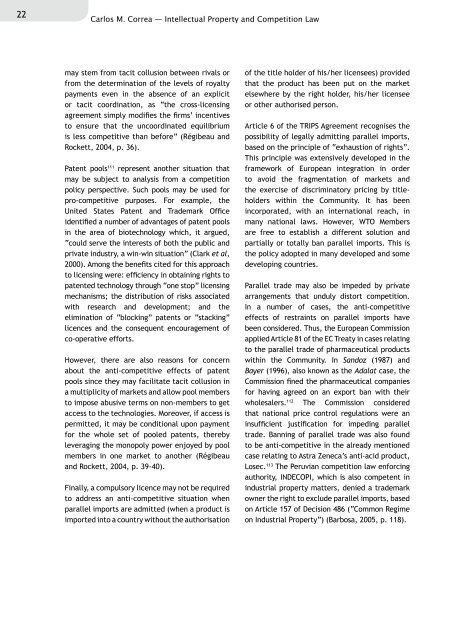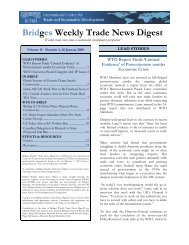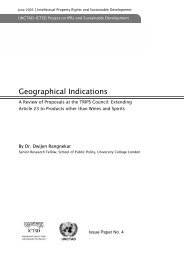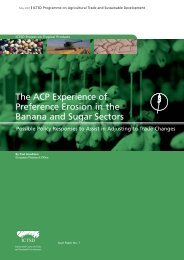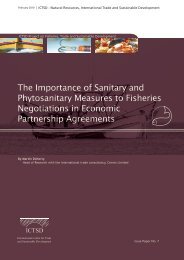Intellectual Property and Competition Law - IPRsonline.org
Intellectual Property and Competition Law - IPRsonline.org
Intellectual Property and Competition Law - IPRsonline.org
You also want an ePaper? Increase the reach of your titles
YUMPU automatically turns print PDFs into web optimized ePapers that Google loves.
22Carlos M. Correa — <strong>Intellectual</strong> <strong>Property</strong> <strong>and</strong> <strong>Competition</strong> <strong>Law</strong>may stem from tacit collusion between rivals orfrom the determination of the levels of royaltypayments even in the absence of an explicitor tacit coordination, as “the cross-licensingagreement simply modifies the firms’ incentivesto ensure that the uncoordinated equilibriumis less competitive than before” (Régibeau <strong>and</strong>Rockett, 2004, p. 36).Patent pools 111 represent another situation thatmay be subject to analysis from a competitionpolicy perspective. Such pools may be used forpro-competitive purposes. For example, theUnited States Patent <strong>and</strong> Trademark Officeidentified a number of advantages of patent poolsin the area of biotechnology which, it argued,“could serve the interests of both the public <strong>and</strong>private industry, a win-win situation” (Clark et al,2000). Among the benefits cited for this approachto licensing were: efficiency in obtaining rights topatented technology through “one stop” licensingmechanisms; the distribution of risks associatedwith research <strong>and</strong> development; <strong>and</strong> theelimination of “blocking” patents or “stacking”licences <strong>and</strong> the consequent encouragement ofco-operative efforts.However, there are also reasons for concernabout the anti-competitive effects of patentpools since they may facilitate tacit collusion ina multiplicity of markets <strong>and</strong> allow pool membersto impose abusive terms on non-members to getaccess to the technologies. Moreover, if access ispermitted, it may be conditional upon paymentfor the whole set of pooled patents, therebyleveraging the monopoly power enjoyed by poolmembers in one market to another (Régibeau<strong>and</strong> Rockett, 2004, p. 39-40).Finally, a compulsory licence may not be requiredto address an anti-competitive situation whenparallel imports are admitted (when a product isimported into a country without the authorisationof the title holder of his/her licensees) providedthat the product has been put on the marketelsewhere by the right holder, his/her licenseeor other authorised person.Article 6 of the TRIPS Agreement recognises thepossibility of legally admitting parallel imports,based on the principle of “exhaustion of rights”.This principle was extensively developed in theframework of European integration in orderto avoid the fragmentation of markets <strong>and</strong>the exercise of discriminatory pricing by titleholderswithin the Community. It has beenincorporated, with an international reach, inmany national laws. However, WTO Membersare free to establish a different solution <strong>and</strong>partially or totally ban parallel imports. This isthe policy adopted in many developed <strong>and</strong> somedeveloping countries.Parallel trade may also be impeded by privatearrangements that unduly distort competition.In a number of cases, the anti-competitiveeffects of restraints on parallel imports havebeen considered. Thus, the European Commissionapplied Article 81 of the EC Treaty in cases relatingto the parallel trade of pharmaceutical productswithin the Community. In S<strong>and</strong>oz (1987) <strong>and</strong>Bayer (1996), also known as the Adalat case, theCommission fined the pharmaceutical companiesfor having agreed on an export ban with theirwholesalers. 112 The Commission consideredthat national price control regulations were aninsufficient justification for impeding paralleltrade. Banning of parallel trade was also foundto be anti-competitive in the already mentionedcase relating to Astra Zeneca’s anti-acid product,Losec. 113 The Peruvian competition law enforcingauthority, INDECOPI, which is also competent inindustrial property matters, denied a trademarkowner the right to exclude parallel imports, basedon Article 157 of Decision 486 (“Common Regimeon Industrial <strong>Property</strong>”) (Barbosa, 2005, p. 118).


